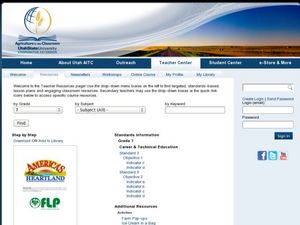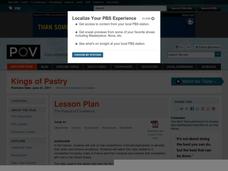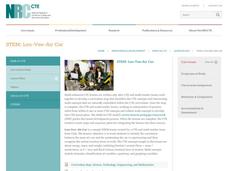Safe Drinking Water Foundation
Water Bottles Everywhere
Young environmentalists examine how water bottle use is polluting the waters on our earth. In groups, your students study the handout on their assigned topic and present their findings to the rest of the class. Leading up to this lesson...
Curated OER
America's Heartland: Step-By-Step Lesson Guide
An excellent resource gets kids looking at agricultural production to better understand the careers needed in distributing foods from the farm to the consumer. Book, poster, web, and video links are included for teacher use. There is...
PBS
The Pursuit of Excellence
Who doesn’t love French pastries and the idea of hard work? Discover different philosophies on hard work, and the skills of French pastry chefs as the documentary concerning the “Best Craftsmen in France” or Meilleures Ouvriers de France...
National Park Service
Living & Non-Living Interactions
What better way to learn about ecosystems than by getting outside and observing them first hand? Accompanying a field trip to a local park or outdoor space, this series of collaborative activities engages children in learning about the...
EduGAINs
Go H2O! Investigating Residential Water Systems
Before your learners excuse themselves to get a drink at the water fountain, prompt them to think about where that water comes from. A middle school science lesson encourages groups to research their community's source of drinking water,...
British Council
Plastic-Free Is Not Easy
Paper or plastic? Scholars discuss a worksheet containing grocery photos in which consumers were challenged to buy items without plastic wrapping or containers. Learners rank the food items by the need for packaging, such as a banana,...
Science & Plants for Schools
Photosynthesis - A Survival Guide
Young scientists learn what it takes for life on Earth to survive with this series of photosynthesis resources. Offering twelve different activities ranging from independent practice worksheets to in depth scientific experiments, this...
Kentucky School for the Deaf
Levels of Organization within an Ecosystem
From tiny organisms to entire biomes, young scientists examine the interdependent relationships tying all living and non-living things together with this collection of ecology resources.
Wilderness Classroom
Ocean Life
Our oceans are composed of many complex relationships. Young oceanographers explore relationships between organisms, understand the world ocean's currents, and discover the effects of water pollution and how it behaves. There are three...
National Wildlife Federation
Habitat Web
Young scientists weave together an understanding of ecosystems with this fun collaborative activity. Taking on the roles of different living and non-living elements of specific habitats, learners use a ball of yarn to create the web of...
King County
Reproductive System
It's every health and science teacher's favorite subject to cover: the reproductive system. This comprehensive lesson introduces adolescents to the reproductive anatomy of men and women with the help of a series of diagrams, discussions,...
National Research Center for Career and Technical Education
STEM: Lou-Vee Air Car
A comprehensive lesson on acceleration awaits your physicists and engineers! Two YouTube videos pique their interest, then sample F=ma problems are worked and graphed. The highlight of the lesson is the building of a Lou-Vee air car!...
Curated OER
Nutrition -- A Lesson for Life - Biology Teaching Thesis
Students briefly explain the importance of nutrition in their everyday lives, and they tell you about how many calories they should consume in a day. They list readily available and affordable healthy foods that they LIKE to eat....
Baylor College
Do Plants Need Light?
Turn your classroom into a greenhouse with a lesson on plant growth. First, investigate the different parts of seeds, identifying the seed coat, cotyledon, and embryo. Then plant the seeds and watch them grow! Measure the new plants...
Desert Discoveries
What's For Dinner?
Youngsters compare the teeth of plant-eating dinosaurs with those of meat-eating dinosaurs. The concepts of herbivore vs. carnivore are also introduced. There is an excellent worksheet embedded in the plan which shows five skulls of...
Consortium for Ocean Science Exploration and Engagement (COSEE)
Arctic Smorgasbord
Though the walrus spends roughly one third of its time on land, it eats organisms that live on the bottom of the ocean. The first in a series of five, the lesson uses a variety of plant and animal cards to have scholars build an arctic...
DiscoverE
Waterproofing the Roof
Can your pupils build a roof that stands the test of time? Use an insightful engineering design project to highlight both materials science and architecture. Scholars either team up or work as individuals to design, create, and test a...
Curated OER
Science Lesson: Chocolate Flavored Cherries
Students are able to identify start and stop sequences in DNA. They are able to model using restriction enzyme and ligase to remove sections of DNA and reattach them. Students are introduced to the process of recombinat DNA through the...
Code.org
The Cost of "Free"
Explore the trade-offs of using a free app. The fourth installment of a 12-part unit helps young consumers discover the cost of receiving a free service. They learn how these apps make use of their access to data.
Curated OER
Money Management Part II: Checking Accounts
Having money is great, learning to manage it wisely is imperative. First, the class has a discussion on the value and convenience of having a checking account. Then, they practice filling out deposit slips, keeping an account register,...
Curated OER
Money Management Part III: Savings Accounts and Cash vs. Credit
Help your class understand the importance of saving and managing their money. Here is part three to a unit on credit, cash, and savings. Learners discuss savings accounts and the idea that a budget plan can help them avoid costly credit...
Advocates for Human Rights
The Right to a Clean Environment in the United States
Even if a school has gone digital, chances are there's still plenty of paper being used. The three activities help scholars learn about the environmental impact of paper and another consumer products of their choosing, the issue of...
EduGAINs
Go Eco! Ecosystems
How is a movie theater like a desert biome? Compare systems to ecosystems with a set of activities that focuses on accessing multiple intelligences and building upon knowledge. As learners discuss the ways elements of an ecosystem depend...
New South Wales Department of Education
Photosynthesis
Venus fly traps photosynthesize and consume insects because the soil they live in does not provide enough nutrients. Scholars analyze historical scientific experiments to learn how scientists discovered photosynthesis. From their...
Other popular searches
- Family and Consumer Sciences
- Family Consumer Science
- Consumer Science Foods
- Consumer Science Manners
- Health and Consumer Science
- Consumer Science Fibers
- Consumer Science Fibres
- Fm & Consumer Science
- Family & Consumer Sciences
- Consumer Science Fib Res
- Consumer Science Careers
- Food and Consumer Sciences

























